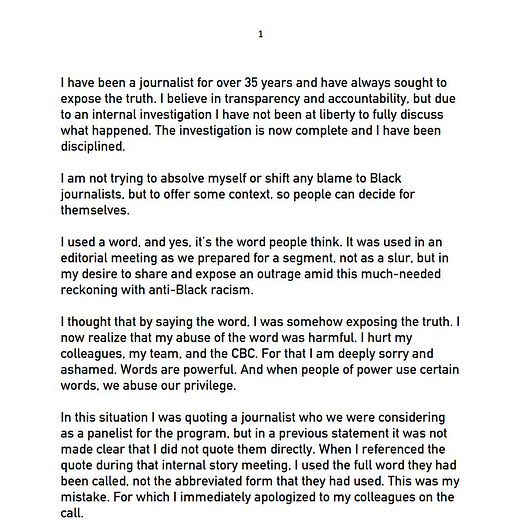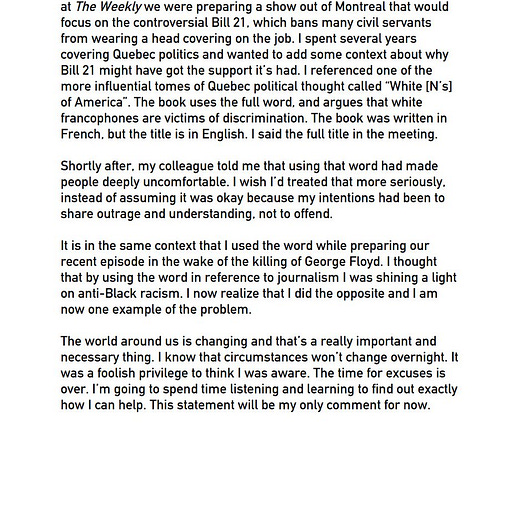Dispatch from the Front Line: You can be wrong, but you cannot lie
We tackle the 1619 project; the one true perspective on Wendy Mesley's sins; and low hopes for the B.C. election.

It was quiet here at the start of the week — sorry about that. We at The Line took a quick look around North America, and the world more generally, and decided to bug out to The Line's alternate virtual newsroom. Things are getting weird out there.
But now that we're safely tucked away in our secure undisclosed location, we have time once more to look upon the world and see the many problems we wish we could make go away. Just as the New York Times is trying to make its problems go away.
You might have heard of the recent controversy regarding the Times’ 1619 Project, a series of Pulitzer-prize winning articles and features that examined the foundational role of slavery in America (1619 was the year enslaved Africans first arrived in British colonies in what would later become the United States). The special section of the Times thus argued for treating 1619, rather than 1776, as the date of the country’s founding. This was, understandably, provocative.
As Canadians, we at The Line have no emotional attachment to either 1619 or 1776. Indeed, the racial unrest that has swept the U.S. makes it clear that America still has a very, very long way to go in healing from the brutal racial divides of its history.
But good intentions don't grant a pass to shaky journalism. The 1619 Project has suffered substantive criticism, most notably over its claim that the American Revolution was fought to preserve the institution of slavery.
The 1619 Project came under even more scrutiny when, last week, project creator Nikole Hannah-Jones claimed that she had never argued 1619 should mark America's "true founding." Indeed, her main essay came shy of making that claim explicitly. However, Hannah-Jones did argue for 1619 as the country's "true founding" on Twitter, and to many observers, the denial came across as a stunning reversal.
It was then discovered that online “display copy” in the New York Times — headlines and summary blurbs — claiming that the year 1619 should mark America's "true founding" was quietly amended online after publication.
The 1619 Project was published in the New York Times Magazine in August of 2019, and it included an editorial by Jake Silverstein, who wrote at the time:
"It is not a year that most Americans know as a notable date in our country's history. Those who do are at most a tiny fraction of those who can tell you that 1776 is the year of our nation's birth. What if, however, we were to tell you that this fact, which is taught in our schools and unanimously celebrated every Fourth of July, is wrong, and that the country's true birth date, the moment that its defining contradictions first came into the world, was in late August of 1619?"
In other words, The Times did not make trivial amendments to wayward display copy. The framing and intent of this entire project is being re-caricatured post hoc; it's revisionist history of revisionist history.
What we don't understand is why.
Claiming that America should see its “true founding” as 1619 is a rhetorical argument, not a statement of fact. Further, even if the historical critiques presented to date fatally undermined that position, there is no shame in refining your work. When faced with valid, good-faith criticism, it is entirely proper for journalists to revisit controversies, either by writing additional reports, or updating old ones.
Typos and little formatting glitches happen and are routinely cleaned up once flagged by an overworked editor, or gloating reader; and those are generally not marked officially as a correction. But actual substantive errors of fact, or amendments to an central thesis — these must be made openly and publicly.
It’s OK to be wrong, but you cannot lie about it. The new journalistic dictates of moral clarity won't get you very far if you have no credibility.
In other Canadian news, the CBC ombudsman issued a report about the network's own coverage of the defenestration of one of its stars, Wendy Mesley.
Mesley was suspended earlier this year after it was reported that she used the "n-word" in two occasions on in story meetings.
The suspension aside, the controversy was the subject of considerable news coverage, both within the private press, and by the CBC itself. Not everyone was happy with how Mesley was portrayed.
CBC columnist Neil Macdonald complained to the network’s ombudsman, Jack Nagler, arguing that CBC's coverage of the affair was tantamount to a smear on Mesley. This week, Nagler came back with a ruling. He disagreed with the beef of Macdonald’s complaint; the initial story was fair, he argued, but the entirety of the stories about the matter lacked balance:
“Given the number of stories CBC News published on this issue (I counted four, as there was also a shorter story on June 12th), it was disappointing that the overall coverage did not offer a wider variety of perspectives. After all, this was a subject of genuine controversy; there were Canadians who considered the corporation’s suspension of Ms. Mesley to be heavy-handed, and those who had the exact opposite view, believing that CBC had not been forceful enough. Yet we had no real sense of the scope of that debate.”
Nagler clearly needs to get with the times at his own organization. Of course stories about Mesley did not offer a “wider variety of perspectives.” How could such a variety be possible when only one perspective is the correct one? Where older traditions of “fairness” and “balance” fit into this new moral order is a question we suspect the CBC will be revisiting in the months and years to come.
We would kindly suggest to the ombudsman that he keep the words “no sense of the scope of that debate” easily to hand from hereon in.
We fear he will be using it again.
Meanwhile, Mesley’s show The Weekly has been dropped and we suspect there will not even be a cake in her immediate future.
And it looks like B.C. is heading into an election, mid-pandemic. New Brunswick recently accomplished the same feat, but the circumstances are very different. New Brunswick is safe inside the so-called Atlantic Bubble. B.C., on the other hand, is one of the Canadian provinces showing an upswing in COVID-19 cases. It seems an odd time to call a vote.
Did we say odd? Sorry, we meant obvious: it's actually clear what Premier John Horgan is doing. Horgan leads the B.C. NDP, which has governed the province for the last three years despite holding a parliamentary minority — the support of the provincial Greens gave Horgan a one-seat hold on the legislature. The NDP is high in the polls. The Green's former leader Andrew Weaver sits as an independent; his replacement, now barely holding onto the balance of power, appears to be far less cooperative than her predecessor. There is only about a year left before another election will be required, so Horgan is rolling the dice.
It could work. But we suspect Horgan would make a stronger case that he's the right guy to lead B.C. through These Unprecedented Times if the party he leads hadn't started the election by pogo-sticking into a diversity minefield by airdropping Old White Man Nathan Cullen into the riding of Stikine, supplanting Annita McPhee, an Indiginous female candidate. The move was in violation of the party's own equity policy.
Oh well. It's not like we didn't know that most progressive politicians were all hat, no cattle when it comes to actually promoting diversity. They just don’t usually reveal their actual level of give-a-shit with quite the enthusiasm of Premier John Horgan.
Corrections:
In the interests of practicing what we preach: we would like to note a correction to an article that appeared this week at The Line. Columnist Jen Gerson wrote: "Our deficit and debt has been declared "unsustainable" by the Parliamentary Budget Office." In fact, the PBO stated that the government would have to rein in its deficit spending or its debt would become unsustainable. The text was edited to be more precise.
While we're here; Gerson also admits to using "secession" in place of "succession" and blames the error on the fact that she has covered too much WEXIT in recent months.
It has also come to our attention that there is some dispute about whether or not "water polo" should be classed as an elitist sport — and, thus, whether it was an appropriate metaphor for Canadian politics. Gerson admits that her understanding of the internal class dynamics of water polo are limited, but suspects that the jury is still out on the matter.
Roundup:
On Monday, Justin Ling noted that the Liberals are hypocrites for violating their own open nomination contests in Toronto Centre and York. "It’s not just that they’re lying. All leaders lie. Erin O’Toole just went through a leadership race pretending he’s a hard-right Tory. The problem with the Liberals is that, after they lie, they want you to congratulate them for it." Bravo, we note, although we suspect that politicians are no less infuriating in the United Kingdom, the United States, Germany, or Sweden. So, you know, the Liberals are good.
In response to Wednesday's throne speech, Jen Gerson also locked the Liberals in a room with no windows and set fire to their hopes and dreams. Figuratively, of course.
And now that the throne speech is over, we can get back to the scandal that the Liberals tried to avoid via proroguing parliament. Robert Jago had one response when he heard that the WE Charity was shutting down its Canadian operations. Good.
Lastly, Alberta Premier Jason Kenney held a weird press conference on Thursday in which he said: “If you really think the billion people in India who desperately want to move to a higher standard of living are all going to be driving Teslas 15 years from now, you’re disconnected from reality... They don’t have the luxury of repeating all these California-style pieties. They want to stop burning cow dung.” Max Fawcett points out that it may, in fact, be Kenney who is disconnected from reality.




